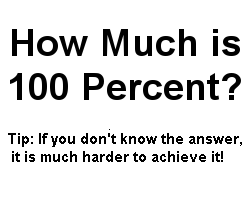
I often ask people what they want to achieve in their business. Much of the time, they really don’t know. I ask questions relating to the sales volume of their industry, the volume they want to achieve, the market share increase they seek, and what they are doing, or willing to do to reach those things. It gets me a lot of blank stares and long pauses on phone lines. This is because they really don’t know.
Many companies don’t have goals, or even the right information to understand what goals are achievable at a given level of marketing effort. They don’t know what it will require to get the results they want, and many times they are entirely shut off to finding out the frightening truth of where they are and where they are headed. When this is the case, they simply do not have all the pieces of marketing math and science in place to make good decisions that will optimize their success.
If you are a marketing professional of any decent calibur, you surely understand this, and deal with it all the time. You will appreciate this story, and wish for each of your customers to understand this. Otherwise, if you are a business person who is not involved in marketing, I will explain why you need to pay attention to your marketing people and stop trying to butt heads with them over things you don’t fully understand. If you don’t understand something, you should work with your marketing people to make things more understandable, and know this: Marketing professionals do a much better job when they are not getting roadblocked by you standing in your own way. They also perform much better if you are not having chest pains over every decision and over every nickel and dime. So, it is best that you pay attention and use what they know to your advantage. That is what they are there for!
The market information I mention here is not intuitive for most people. It is the data that a marketing director or consultant can deliver for you, digest for you, and provide continually updated measurement. Tragically, it is often overlooked when somebody chooses to kneecap the marketing department because they don’t understand the work we provide. It is important to have this information in order to build your strategy, or it will be much harder and usually impossible to achieve optimal results. If you overlook these fundamentals, you are building on a weakened foundation. It makes perfect sense, right? Fine, maybe not yet … so I’ll continue.
Without accurate information about market potential, a defined set of business objectives, and a clear knowledge of what it will take to meet your well-planned goals, a marketing campaign is often little more than an experiment in wasting money. Marketing should never be a “shot in the dark” like this, but I see it very often that this is the way companies, large and small, approach their market. It leaves little wonder why some companies view marketing as a risk, while others understand the sound investment it really is. When this miserable fate of marketing fear gains control, companies suffer in huge ways. The common cause is lack of research and planning. The common outcome is that somebody makes an executive decision to slow down the marketing train and pull it off the tracks.
When Return on Investment Goes Negative
Positive return on investment (ROI), is the magical part of marketing that keeps a business steaming forward. Sometimes companies accidentally stumble on a positive return on investment. After all, even a broken clock is right twice per day. When the return on investment comes without good planning, it is often just out of “luck”, and that “luck” runs out. When it is based on yesterday’s market information and yesterday’s strategy, a similar drop in ROI can be expected.
If you have encountered this in your company, let’s look at this again and reevaluate the importance of marketing. Marketing is what makes companies successful. Without good marketing, many phenomenally great companies have failed. Conversely, many presumed failures have become successful because of good marketing. There is a strong correlation in the outcome of a company and the quality of their marketing. Not just quantity of their marketing … I said quality. This requires providing your marketing people the resources they need so they can deliver what the company needs.
Marketing provides the math that runs the machine, and has a huge influence in everything from determining the right selling price of goods or services, to the CEO’s salary. It is a lot more than just advertising, branding, or updating your Facebook status. When marketing is done right, it is approached as a holistic strategy to make the company stronger and more profitable.
Call for Marketing: A True Story
I received a telephone call from an existing client. Actually, he is more like a customer, because he thinks like a customer and creates his own roadblocks like a customer, which is unlike a client. I consider customers and clients two entirely different things.
Let me explain this: In my business, clients view me as an integral partner in their success, and not just a person who completes a series of tasks. They understand that my knowledge and experience is what brings them success, and not just my performance of a set of prescribed deeds. They pay attention, and they take my advice very seriously. Clients don’t tell me what to do about their marketing … they ask me what to do about their marketing.
To be a client, a person cannot nickel and dime their way through and stumble along an undefined path until they make it. We set goals together based on solid facts and market data, and we adjust them as needed. We create a finely polished plan and we work together to make that plan a success.
So, about the person who called me, I like this guy. He has been a customer for about four years, and we have built a relationship in that time. I consider him my friend. He has been to my home, and he has met my family. We are not strangers, and we have a mutual trust. If he says a check is in the mail, I trust him (unlike this example from Suture Express). I believe that he trusts me, too, but he gets in his own way. He likes to be in control, and he likes to prescribe specific marketing tasks. That is fine, because if he has less than optimal results, it is ultimately not my fault. On the other hand, it kind of makes me feel a bit dirty and icky to just do what he says when I know he is making a mistake.
The troubling part is that when I explain why he should be doing something differently, the train gets derailed. It is not really because he does not have faith in me. As I said, he has been to my home, and he has witnessed first-hand that I am more than just a little bit successful in my field. What I have determined is that he has a hard time putting faith in his own plan … because he doesn’t really have a plan. He just knows he wants to make more money, but he refuses to take a strategic approach, regardless how sincerely or logically I urge him to do so.
In our recent discussions, he has explained that he wishes to market a product that he believes in very much. The product is in one of the most competitive industries in the world, and includes a line of very exclusive products with a specific market that is typically affluent. I asked him the common questions, and he does not yet have all the answers. What he could tell me is that he wants to hit the market at full strength. In his own words, he wants to put 100 percent into the marketing effort. When I told him that he had better prepare to mortgage his oceanfront home, his boat, and his first-born son, he probably thought I was joking.
Let me insert a bit of fact so that you can really understand this. My customer recently experienced a common fate as his employer of 20 years sold off his division to an overseas company and he became jobless. Because of his age and his specialized experience, he decided to avoid the underwhelming job market and take a new focus. He has chosen to sell a line of products that he and his wife’s other company has had some success with.
My friend and customer is an accountant by trade. In fact, he is a damn good one, who has been charged with accounting for a whole lot of millions of dollars by a sizable corporation. He has his Master’s degree in accounting and I believe he has done a great job with it. He is not a marketing professional.
His idea of putting “100 percent” into the new business venture was still expected to be manageable with a budget of under $10,000. Ten thousand dollars?! Can you even imagine that? His goal is to replace his full-time income of a senior accountant of 20 years with an investment of less than a month’s income. If that level of investment success was possible, don’t you think McDonald’s, Wal Mart, Microsoft, and Google would have already cornered that market?
So, in order to try and keep his perception of risk low, I introduced the idea of a partnership of sorts, whereby I would provide marketing on a contingency basis. I would not have done that if I didn’t have a degree of faith in his idea, and trust for him as a businessman. I also normally do not provide such a service with woefully under-capitalized companies, or those which are unwilling to listen and take good advice from an experienced consultant.
What I realized, as I considered this a little closer is that such a partnership is really not a good idea for me, simply because of his unwillingness to understand the importance of marketing. After all, the emphasis of his new company is nearly entirely based on marketing. Instead, I will offer him the opportunity to prescribe a set of tasks, pay me as a customer, and tell me how he wants to handle his marketing.
The way it turns out, he mostly believes that the emphasis will be in the production of a really great website and some social media exposure, but gives little thought of what else it takes, and what else I know. He wants me to produce his ecommerce website development, initial search engine optimization efforts, and set up a social media presence. The four-digit budget will be exhausted long before I can complete these tasks at an optimal level, but since he is a great guy and existing customer, I will stretch my work out beyond his spending cap. I will do a an exceptional job for him, and I will not let him down.
My customer’s chosen direction will leave no room for strategy development, data acquisition, customer modeling, industry market research and forecasting, or the many other things which need to be done to create a successful market penetration. However, it will provide a sense of control and security for my customer. He will fall far short of what he could achieve if he actually could bring himself to put forth a 10 percent effort, but I cannot tell somebody how to run their business. My job is to tell them how they could run their business, what they could achieve, and help direct them there. As for the 100 percent effort he talked about … he has no concept of what a 100 percent effort looks like in a competitive market. He has only seen that in movies.
Summary: You Cannot Save Your Way to Prosperity
If you approach your market like the customer I have described, you will miss a lot of potential. In fact, it is a good recipe for failure. A reality of marketing that is difficult for many people to grasp is that you cannot save enough money to become prosperous in business. To become prosperous, you have to invest it, and do so with good direction and dedication.
I like the way Thomas Jefferson put it with the inspiring quote as follows:
“The man who stops advertising to save money is like the man who stops the clock to save time.”
–Thomas Jefferson
Don’t just take it from me, look at your own company. If you are investing wisely in your business, you know that I am right. On the other hand, if you are trying to save money in order to keep your cost low, your profit is undoubtedly much lower than it could be, too.
I shared my description of what I call a client versus a customer. The question that I really hope you can answer for yourself is which makes more sense in your business. Would you rather be a client or a customer?
- “How Much Does SEO Cost?” is The Wrong Question
- Enterprise SEO Services: How Enterprise Justify SEO Cost
- Push Your Marketing “Go” Button
- How Much Does a Website Cost?
- SEO and Web Development Hourly Rates
- Marketing Cost vs. Marketing Value
- Websites As Low As $175,000 + $25,000 Monthly Maintenance
- Where Does Marketing Talent Come From and What is the Cost?
Podcast: Play in new window | Download







